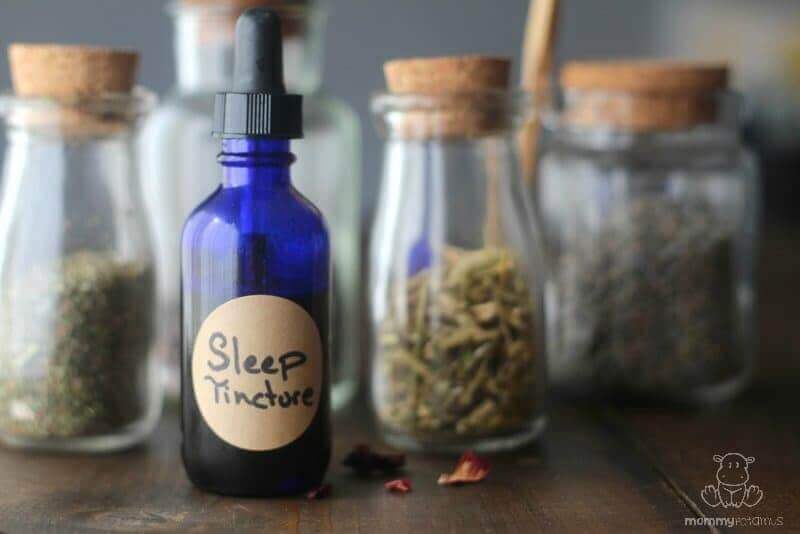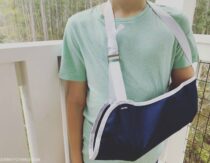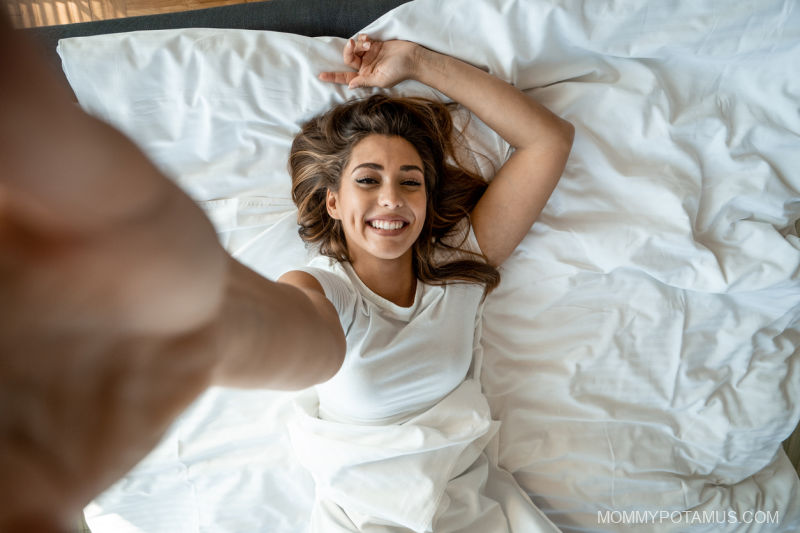
Inside: 23 science-backed sleep tips for deeper, more restful zzz’s that work even if you have kids!
Have you ever woken up with an “aha” solution to a problem? If so, you’re not alone. Dreams are linked to some of the most important breakthroughs in history, including the Theory of Relativity, the shape of DNA, and countless inventions.
Of course, sleep is more than just an “aha” generator.
In our daily lives, studies show that good sleep makes us smarter, happier, more productive, more creative, and it even keeps us looking younger. (1) (2) (3) (4) (5) (6)
Unfortunately for most of us, getting good sleep (and enough of it) can be challenging to say the least.
Maybe, like me, you went into the whole parenting gig thinking that the phrase “sleep like a baby” indicated actual sleep was going to be had by all. (Nope.)
So how do we get deep, restorative zzz’s when circumstances are not ideal? As a mama of three, I’ve done quite a bit of research on this subject, and my entire family’s sleep quality has improved as I’ve implemented what I’ve learned.
Here’s what I’ve found most helpful:
- 1. Get Sunlight First Thing In The Morning
- 2. Avoid Blue Light At Night
- 3. Optimize Your Levels Of This “Magic Mineral”
- 4. Sleep On A Good Mattress
- 5. Give Aromatherapy A Try
- 6. Try A Weighted Blanket
- 7. Get Grounded
- 8. Set A Caffeine Curfew (And Stick To It)
- 9. Avoid Light Pollution
- 10. Chill Out
- 11. Let The List Go (Just For A Little While)
- 12. Flex Your Muscles
- 13. Sip Don’t Slurp
- 14. Try Pink Noise
- 15. Take A Warm Bath
- 16. Brew Sleepy Tea
- 17. Respect The 10-2 Window
- 18. Turn Off Wifi At Night
- 19. Try Red Light Therapy
- 20. Fast 3 Hours Before Bed
- 21. Try Savasana Pose
- 22. Meditate
- 23. Drink Cherry Juice
1. Get Sunlight First Thing In The Morning ^
Our circadian rhythms – which orchestrate the ebb and flow of cortisol and melatonin – are tied to light and darkness. Cortisol helps us get going in the morning, and melatonin tells our body when it’s time to wind down for bed. Problem is, most of us are out of sync.
To get our internal clock back on track, we need to spend 15-30 minutes in bright sunlight early in the morning. In one study, workers who got regular sunlight tended to be more physically active during the day and got more sleep at night. They were also found to be generally happier and reported fewer health problems.
Although the workers in that particular study got light throughout the entire day, other research indicates that early morning light produces the best effects. (7) (8)
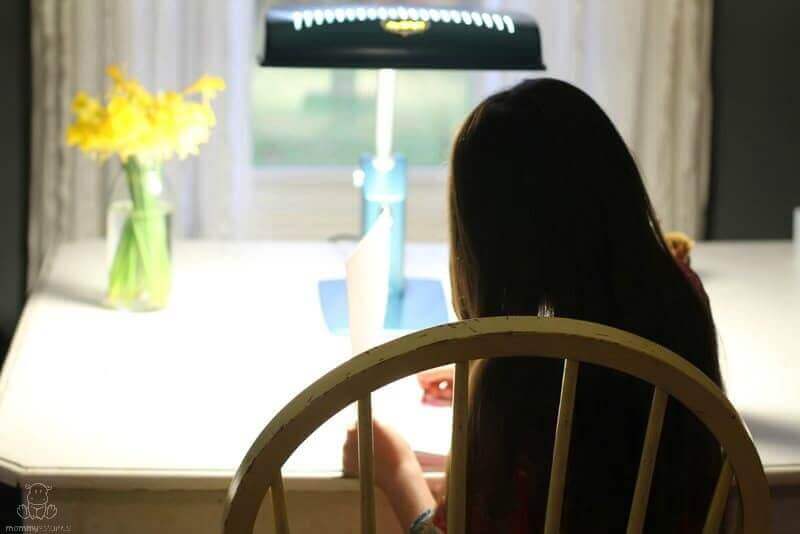
Sleep Hack #1: Indoor Bright Light
If you don’t roll out of bed, yawn daintily like Julie Andrews, and then go out in your front yard to sing about how the hills are alive with the sound of music, that’s okay. You can still get the mood and sleep supporting benefits of early morning light.
These days my schedule allows for an early morning walk, but a few years ago going outside for 15-30 minutes of sun just wasn’t practical for my family most mornings. To get the benefits of early morning light I bought a daylight lamp and put it on the kitchen table while my kids worked on art projects or homeschool assignments.
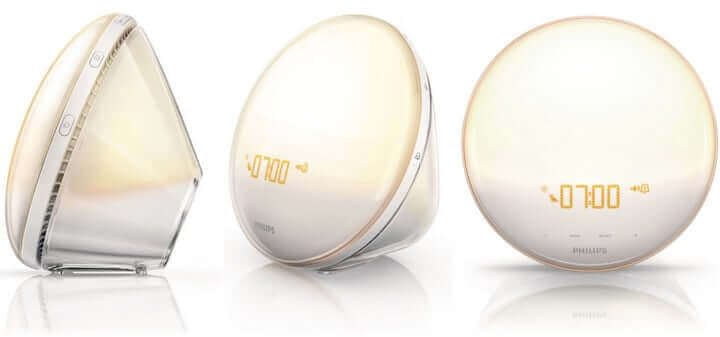
Another option is this wakeup light, which simulates sunrise in your bedroom. It was developed by Phillips, who:
carried out extensive research with leading light therapy experts into the relationship between light and well-being. That research showed a positive correlation between dawn simulation and how people feel when they wake up. Waking up to gradual light, like a sunrise, is hard-wired into the human brain.
As light falls on a person’s eyes, a message is sent to their brain that stimulates production of cortisol, known as the energy hormone. Waking up to dawn simulation has also been proven to help keep a person’s internal body clock in sync. It helps to regulate our circadian rhythm, promoting better sleep and reduced stress levels – unlike waking up in the dark to a sudden noise like a traditional alarm clock.” (9)

2. Avoid Blue Light At Night ^
We need sunlight during the day to keep our circadian rhythm on the right track, but sunlight at night? Now, that’s just downright confusing to our bodies.
Unfortunately, computer screens, TVs, smartphones and even regular light bulbs emit blue light, which the body perceives like sunlight. According to some studies, blue light exposure after sundown can suppress the release of melatonin, which is the hormone that tells our body it’s time for bed.
That’s not all it does, though. In addition to signaling when it’s time to sleep, this hormone also:
- Regulates immune function (10)
- Supports cardiovascular health (11)
- Is produced in the gut as well as the brain, where it may help regulate a unique, gut-specific circadian rhythm (12)
Unfortunately, although melatonin supplements may have some benefits they also have potential side effects, especially when used long-term. One expert called their use with children “rather alarming” due to the potential for long-term effects. You can read more about melatonin supplements for sleep here.
But what’s that – you’re not ready to give up screen time after the kids go to bed? Yeah, me neither, and for that matter I’m not going to turn off all the lights and sit in darkness either.
Fortunately, there are ways to reduce blue light exposure anyway, and research has shown them to be very effective. (13) (14)
Sleep Hack #2: Block The Blue
Here are three tips for reducing blue light at night:
Bright light suppresses more melatonin than low level light, so dim the lights in your house around sunset. I also dim my computer screen, but that’s optional.
To block blue light coming from ambient lights or a TV screen, consider wearing amber-hued glasses at night. Here are a few of my favorite options:
- For men, I like Defendershield (SAVE 20% WITH CODE MP20)
- For women, I have used and loved these these funky & cute frames and also a pair of Defendershield’s (SAVE 20% WITH CODE MP20)
- For kids, you’ll find all my favorites here.
Install F.lux. It’s a free software that removes blue hues from your computer screen at night.
Add an Ocushield screen filter – Apply this transparent film onto your device’s screen like you would a screen protector, only this one blocks up to 90% of blue light emissions. And unlike apps and ‘night mode’ settings, Ocushield doesn’t change the color on your screen. It’s an accredited Class 1 medical device by the MHRA in the UK.
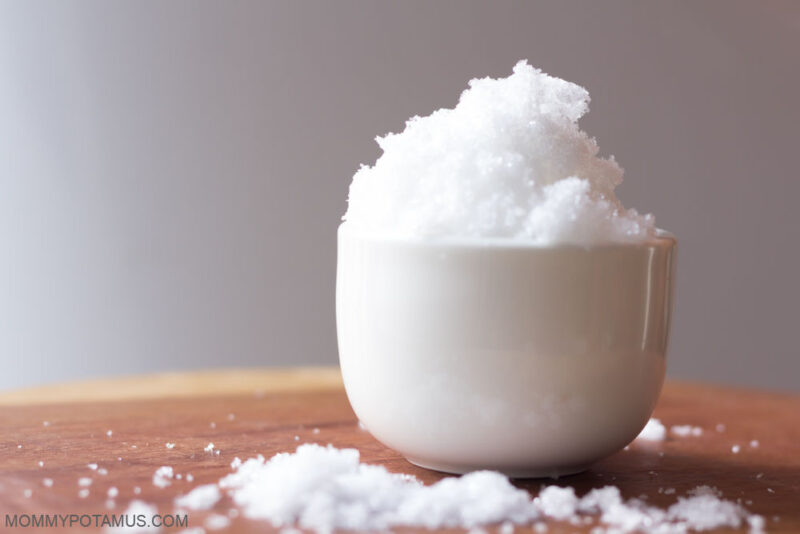
3. Optimize Your Levels Of This “Magic Mineral” ^
Sleep problems can be a symptom of magnesium deficiency. We’re not exactly sure why, but we do know that this “miracle mineral” relaxes achy muscles, and calms the mind by assisting with the production of the neurotransmitter GABA and mitigates the effects of stress, so that may be part of it.
This study also suggests that magnesium may improve sleep quality by increasing melatonin levels and decreasing cortisol levels.
How To Improve Your Magnesium Levels
The best way to get magnesium is through food, because whole foods come with cofactors that help with nutrient absorption. Unfortunately, due to soil depletion and factors such as stress which increase our need for magnesium, it’s difficult to get all we need from food.
Here’s a guide to magnesium supplementation and here’s a bath salt recipe that can help improve levels.
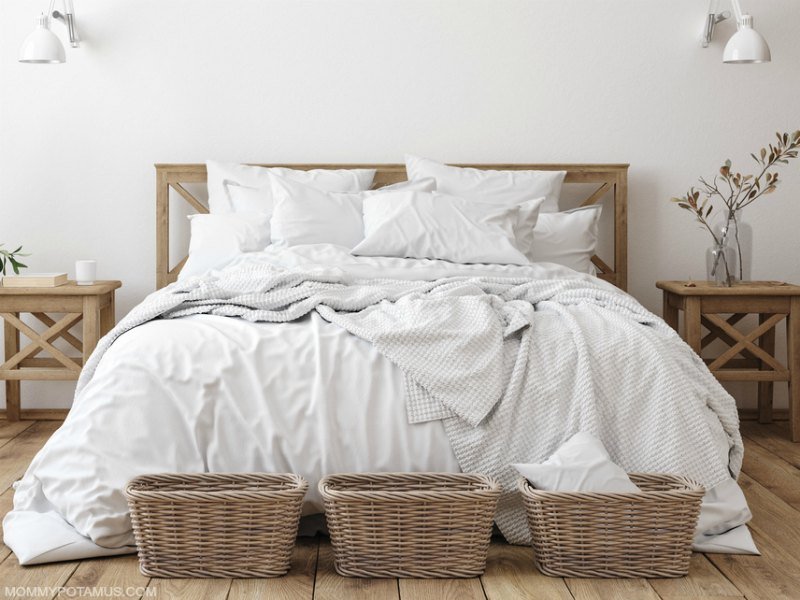
4. Sleep On A Good Mattress ^
Obviously, right? But seriously, this makes a huge difference.
When we sleep on an uncomfortable bed it creates pressure on our hips, back, and shoulders, and we have to move frequently to redistribute our weight. If we don’t, areas under pressure lose circulation and tissue gets damaged. According to the Mayo Clinic, ”Bedsores — also called pressure sores or pressure ulcers — are injuries to skin and underlying tissue resulting from prolonged pressure on the skin.”
Obviously, our bodies do whatever it takes to prevent this damage from happening. Since we don’t typically move around while remaining in Stage 3 and 4 sleep, we have to come up out of that deep, restorative sleep back into lighter sleep to shift our weight. These “micro-arousals” may inhibit or stop the release of human growth hormone during deep sleep. (15)
In other words, frequently shifting our weight during sleep may prevent us from getting adequate amounts of deep, restorative sleep.
My favorite non-toxic mattress company has solved this problem by creating a mattress that is both soft (for pressure relief) and firm (for proper spinal alignment). I know, it’s always been an either/or choice, but their solution is the real deal.
Click here to read about why I love IntelliBED. Also, My Green Mattress also makes handcrafted, affordable mattresses with organic materials. I got one for my youngest son and it’s super comfy. You can read more about My Green Mattress here.
5. Give Aromatherapy A Try ^
In this small study, lavender essential oil placed in an essential oil diffuser improved quality of sleep for participants. In this study, it increased deep, slow-wave sleep in both men and women.
Here are a few popular essential oil blends that were created to support restful sleep:
- Sleep Aid Synergy with lavender, mandarin, ylang ylang, valerian root, and neroli
- Sleep Tight with lavender, mandarin, ylang ylang, neroli and hops extract
- Sweet Dreams for Kids with sweet orange, juniper, coriander, blue tansy and rose absolute
- Nighty Night for Kids with lavender, sweet marjoram, mandarin, cedarwood atlas, patchouli, clary sage, Roman chamomile and blue tansy
- Sweet Slumber for Kids with Himalayan cedarwood, Ho wood oil, sweet orange, Roman chamomile and vetiver
When diffusing essential oils, a good rule of thumb is diffuse for 30-60 minutes, then take an hour off, then repeat if desired. Many diffusers have a timer that you can set to shut off automatically.
This diffuser has an interval mode that allows it to run 10 minutes on/20 minutes off for up to 21 hours. Click here to discover more uses for lavender essential oil.
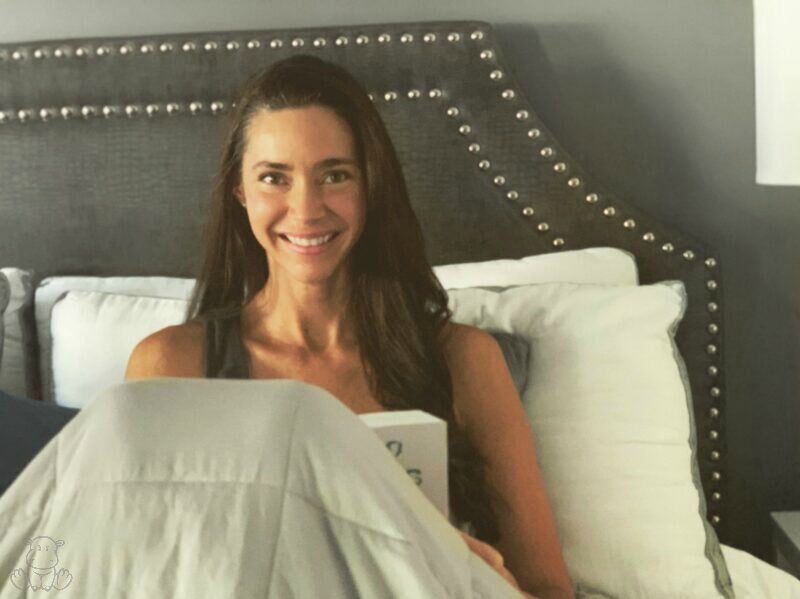
6. Try A Weighted Blanket ^
Research shows that weighted blankets improve sleep quality, reduce stress, improve daytime focus and mood, and ease symptoms associated with sensory processing disorder.
Here’s how they work, and how to choose the right one for you.
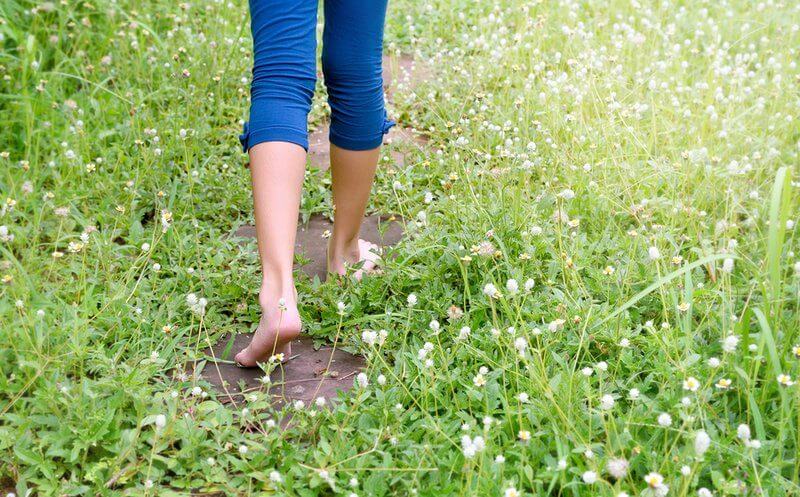
7. Get Grounded ^
A practice called “grounding” or “earthing” is thought to help regulate our hormonal ebbs and flows with a mechanism similar to early morning light. In a study conducted by Ghalv, M.D. and Dale Teplitz, M.A, earthing reduced overall levels of cortisol and fine-tuned the secretion cycle so that levels were highest in the early morning, which is when it’s most needed.
To practice earthing, all you need to do is go outside and walk barefoot on grass, soil or sand . Read more about it here.
Another similar practice – forest bathing – has been shown to significantly increase sleep time. Here’s how to do it.
8. Set A Caffeine Curfew (And Stick To It) ^
Sip that cuppa joe (with 200mg of caffeine) at 3pm, and chances are pretty good that 100mg will still be active in your system at 9pm. Everyone metabolizes caffeine at a different rate, so do some experimenting and find out when your cutoff point should be. (16)
9. Avoid Light Pollution ^
We now know that our skin senses light in ways we used to think only the eyes could, so light can disrupt our circadian rhythm even when we’re wearing a mask.
Blackout curtains can reduce or eliminate light pollution, and they don’t just come in black. Check out some of the colors that are available here.
Also make sure to cover any lights on your alarm clock or other electronic devices.
10. Chill Out ^
“’When you go to sleep, your set point for body temperature — the temperature your brain is trying to achieve — goes down,’ says H. Craig Heller, PhD, professor of biology at Stanford University, who wrote a chapter on temperature and sleep for a medical textbook. ‘Think of it as the internal thermostat.’ If it’s too cold . . . or too hot, the body struggles to achieve this set point.” (17)
Experts say the ideal sleep environment for most people is between 65-72F, so find what works for you. I recommend wearing loose, light pajamas to bed so you don’t overheat.
However, if you find that you’re having trouble sleeping because your feet are cold, put on a pair of warm socks.
According to this article, research shows that as you get sleepy, your “body’s temperature regulation system redistributes heat from your core to your extremities. Having cold feet demands more from this system and upsets the natural release of melatonin, a hormone related to a proper sleep-wake cycle.”
11. Let The List Go (Just For A Little While) ^
If you feel overwhelmed by “to do” lists or other distractions at night, a handful of studies show that meditation and/or relaxation may help you let go and relax.
I’ve found deep breathing throughout the day to be helpful, and I also love to listen to relaxing music and/or podcasts while winding down at night.
12. Flex Your Muscles ^
Though it can take up to four months, one study found that regular exercise may lengthen the amount of time we sleep while and improve overall sleep quality. (18)
Based on their findings, I aim for 30 minutes at least three or four times a week.
13. Sip Don’t Slurp ^
Though alcohol can sometimes help with falling asleep, it actually hurts overall sleep quality by disrupting normal sleep patterns. (19)
Researchers are not exactly sure why that is, but some theorize that it has to do with the inhibition of melatonin secretion and/or its ability to cause spikes in blood sugar that jolt us wide awake at 2am.
Whatever the reason, if I opt for natural wine or hot buttered rum, I make sure to enjoy it early in the evening so that it doesn’t interfere with my sleep. And of course, I sip rather than slurp.
14. Try Pink Noise ^
White noise machines create a “wall of sound” that drowns out annoying noises like traffic and dogs barking, but according to Scientific American it may have a downside. I wrote all about it here, but the gist is this:
- White noise uses static to block other sounds, but since people find static annoying nature sounds (rain, waves, etc.) are layered over the static. Even though we don’t notice the static, it contains a large range of frequencies, including high-pitched ones that are stressful to the body.
- Pink noise is similar to white noise, but it filters out the harsh frequencies and only uses deeper, slower frequencies.
Researchers think pink noise may help with sleep because the “steady drone of pink noise slows and regulates your brain waves, which is a hallmark of super-restful sleep.” (20)
In this German study, “pink noise appeared to prolong deep sleep and to increase the size of the subject’s brain waves during that period, as evinced by their EEGs.”
According to the writeup, “The slow brain waves that characterize deep sleep are implicated in information processing and memory formation, and sure enough, on the mornings after those brain waves appeared to have been enhanced, the participants remembered a higher number of word pairs (an average of 22, as opposed to 13).”
In another study conducted by Jue Zhang, Ph.D., an associate professor at China’s Peking University, “An impressive 75% of study participants reported more restful sleep when exposed to pink noise. When it came to brain activity, the amount of “stable sleep”—the most restful kind—increased 23% among the nighttime sleepers exposed to pink noise, and more than 45% among nappers.” (20)
How To Incorporate Pink Noise For Deep Sleep
Because of all the research on pink sleep, several white noise devices now offer pink noise settings, too. Here are some of them.
- LectroFan EVO – Comes with white, pink and brown noise (which is beneficial like pink noise but deeper) and ocean sounds.
- Honeywell Dreamweaver Sleep Fan – This machine generates pink noise and can be used as a fan (with airflow) or just as a sound generator (no airflow).
15. Take A Warm Bath ^
While our bodies are designed to sleep best in a relatively cool environment (usually 65-72F), a warm bath or shower before bed can a facilitate good night’s sleep.
When your core temperature drops at night, it triggers the release of melatonin and signals to the brain, ‘Time to get sleepy.’ ‘A hot-water immersion will cause blood flow to the extremities (notice how your skin gets flushed after a Jacuzzi or a sauna?) and away from your vital organs, lowering your core body temperature and encouraging sleepiness.” Michael J. Breus, Ph.D., author of The Power of When.
According to this study, a hot bath taken 1.5 hours before bed decreased sleep fragmentation in older adults with sleep challenges.
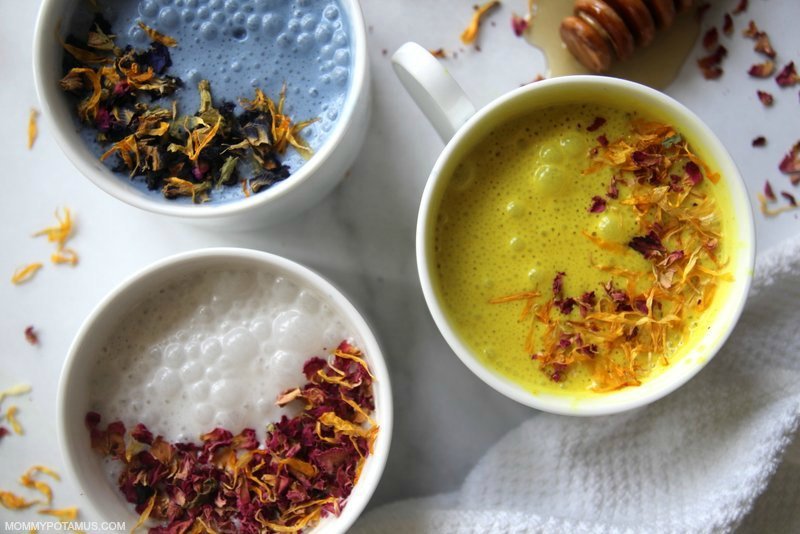
16. Brew Sleepy Tea ^
Brew up a relaxing herbal tea like chamomile or kava kava, which studies suggest may help with falling asleep. (21) (22) Researchers also found lavender tea to be helpful for improving sleep in new moms.
Here are some recipes to try:
- Banana tea contains compounds that support restful sleep.
- Kava has long been used for stress-relief, deep sleep and neuromuscular relaxation, but there are safety considerations that are important to be aware of. In this article I dive into them, and share a recipe for kava tea.
- Moon milk is a creamy herbal tea with Ayurvedic origins. Here’s how to make it.
- Sweet dreams tea is made with calming herbs like lavender, catnip, and chamomile.
- This sleep dust recipe makes an instant cup of powerful sleep promoting herbs. Just add water!
17. Respect The 10-2 Window ^
I recently heard Dr. Alan Christianson – author of the The Adrenal Reset Diet – say at a small gathering that our bodies are hardwired to do most of their intensive healing/repair work between the hours of 10pm-2am. This may be because in more primitive environments, this window of time is the safest for us to be out of commission.
Remember, we don’t move in the deeper stages of sleep, so we’re more vulnerable, so in natural environments it’s probably best to get that kind of sleep out of the way while predators are still groggy from waking up for their “day,.” That way, we’re more alert when predators are fully awake and prowling, so we can run away if needed.
Another interesting phenomenon Dr. Christianson mentioned is the second wind. If you’ve ever had a day so exhausting that you’re ready to fall asleep at 6pm, but then somehow you start scanning social media and – BOOM – it’s 10:30 and you’re still wide awake.
According to Dr. Christianson, chances are that your body released hormones intended for intensive repair (aka beauty sleep), but because you hadn’t gone to bed yet you experienced it as an energy rush instead.
Now that I know about the second wind I try to avoid it, and I’ve noticed it makes a big difference for my adrenal health. I want all those lovely hormones to repair my body and help me feel good, not keep me up watching cat videos.
18. Turn Off Wifi At Night ^
In his book, Overpowered, Dr. Martin Blank of Columbia University argues that EMF exposure is having a profoundly negative effect on our bodies, especially when it come to DNA repair. Dr. Blank doesn’t recommend complete avoidance, but suggests instead that we take precautions with them just like we do with other activities – like wearing seat belts while driving.
Since much of our most important DNA repair activities happen while we sleep, it may be wise to turn off sources of intense EMF exposure during that time.
Note: In addition to turning off wifi, I would also keep cell phones out of the bedroom or in airplane mode.
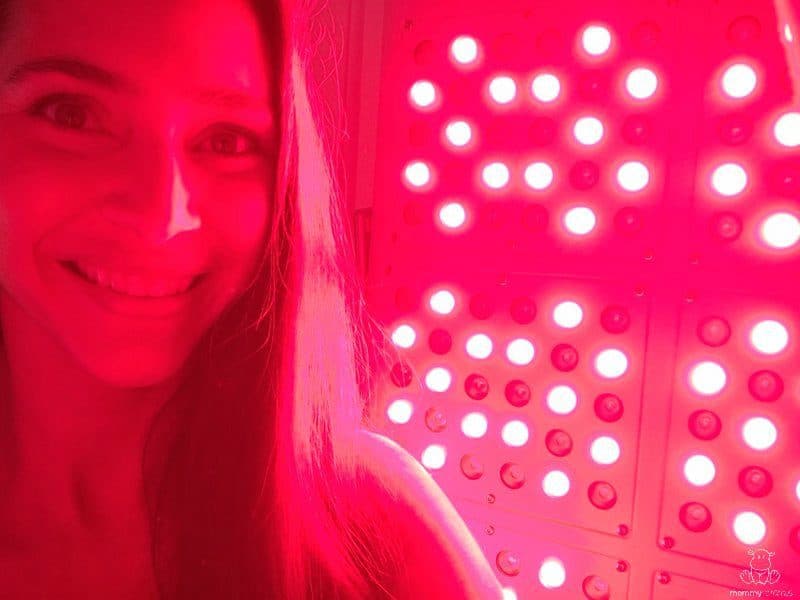
19. Try Red Light Therapy ^
In this study, female athletes who received red light therapy at night had higher levels of melatonin than those who did not.
20. Fast 3 Hours Before Bed ^
According to Dr. Breus: “Eating within three hours of bedtime – late-night snacking – sends blood and heat to your core, which is a signal to the body to stay awake.” (19)
Avoiding meals and snacks close to bedtime may make it easier to fall asleep. Also this approach – often called intermittent fasting – has also been linked to:
- Improved metabolic function
- Activated autophagy, which is what keeps our bodies from filling up with cellular “trash” (damaged mitochondria, free radicals, etc.)
- Improved learning and memory
- Decreased inflammation
- Improved immune function
Click here to read more about the benefits of intermittent fasting and how to do it.
21. Try Savasana Pose ^
Relaxing yoga poses are correlated with higher levels of melatonin according to this study.
22. Meditate ^
The brain responds to calming practices by releasing melatonin, as is evidence by this study (and this one, and this one).
I’m not great at meditating in the traditional sense, but my bedtime routine sometimes includes things that have a similar effect. Coloring, for example, can have a similar neurological effect to meditation/relaxation practices.
23. Drink Cherry Juice ^
According to one study, adults suffering from insomnia slept an average of 84 additional minutes after consuming tart cherry juice two times per day for two weeks. Some parents rave about cherry juice as a children’s sleep aid, including my friends Genevieve of Mama Natural and Cara of Health Home & Happiness.
Ideally, the cherry juice would be consumed during the day, not within the three-hour window before bed. (See #20 above.)
This article was medically reviewed by Dr. Scott Soerries, MD, Family Physician and Medical Director of SteadyMD. As always, this is not personal medical advice and we recommend that you talk with your doctor.
What tips and tricks for getting good quality sleep have you found most helpful?
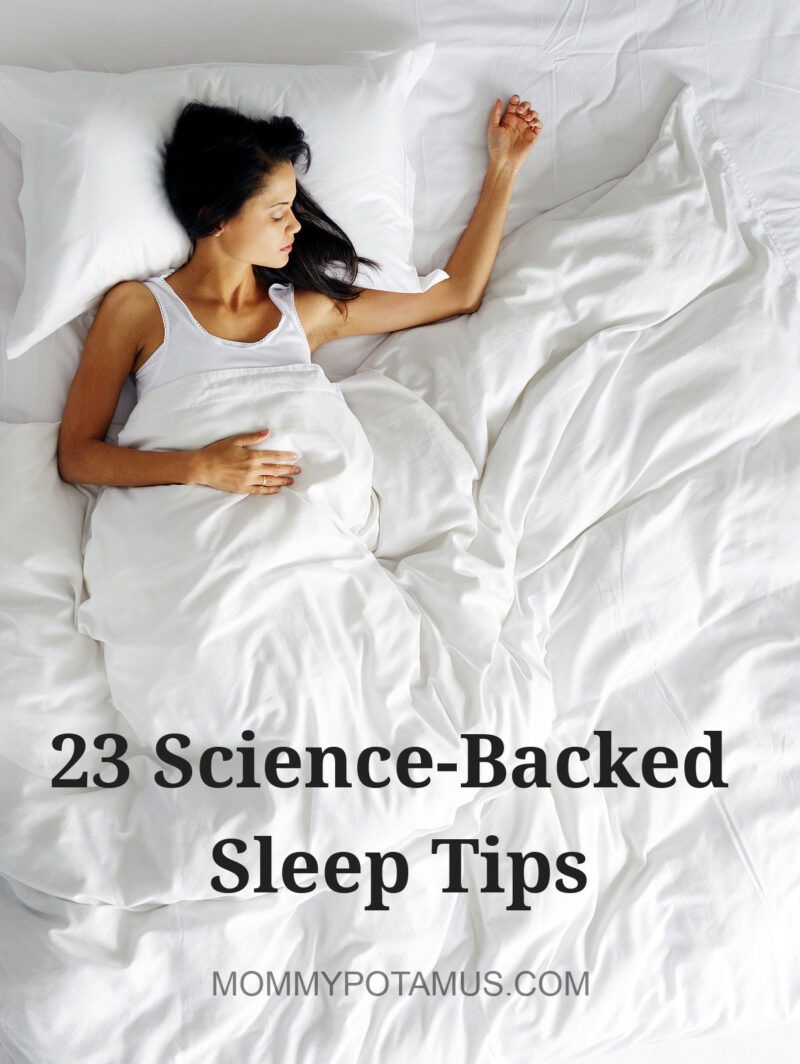
Sources:
1. Scientific American (2008) Sleep On It: How Snoozing Makes You Smarter
2. PBS (2012) Can Sleep Make You Smarter?
3. BBC (2013) How Sleep Makes Your Mind More Creative
4. American Psychological Association (2014) Sleep Deprivation: More Sleep Would Make Most Americans Happier, Healthier and Safer.
5. Stump, Scott (2013) “Nap Rooms” Encourage Sleeping On The Job To Boost Productivity
6. Harris, Shelby (2013) Sleep and Longevity: 5 Ways Sleep Keeps You Young
7. Northwestern University (2014) Morning Rays Keep Off The Pounds
8. Dodson, Ehren and Zee, Phyllis (NIH 2010) Therapeutics for Circadian Rhythm Disorders
9. Phillips Company. Waking Up To Sunrise
10. Carrilo-Vico, Antonio et. al. (2013) Melatonin: Buffering The Immune System
11. Zukiswa, Jiki et. al. (2018) Cardiovascular Benefits of Dietary Melatonin: A Myth or a Reality?
12. Mukherjee, Sourav and Maitra, Saumen Kumar (2015) Gut Melatonin In Vertebrates: Chronobiology and Physiology
13. Burkhart, K and Phelps, JR (2009) Amber lenses to block blue light and improve sleep: a randomized trial
14. Sasseville, A et. al. (2006) Blue blocker glasses impede the capacity of bright light to suppress melatonin production
15. Cline, John (2010) The Mysterious Benefits of Deep Sleep.
16. Mandal, Ananya. Caffeine Pharmacology
17. WebMD. Can’t Sleep: Adjust The Temperature (Sleep Disorders)
18. New York Times (2013) How Exercise Can Help Us Sleep Better
19. Rupp, TL et. al. (2007) Evening alcohol suppresses salivary melatonin in young adults
20. Prevention (2012) The Noise That Will Help You Sleep Better
21. Srivastava, Janmejai et. al. (2010) Chamomile: A herbal medicine of the past with bright future
22. Shinomiya, K et. al. (2007) Effects of kava-kava extract on the sleep-wake cycle in sleep-disturbed rats
23. Breus, Michael (2016) The Power of When.


